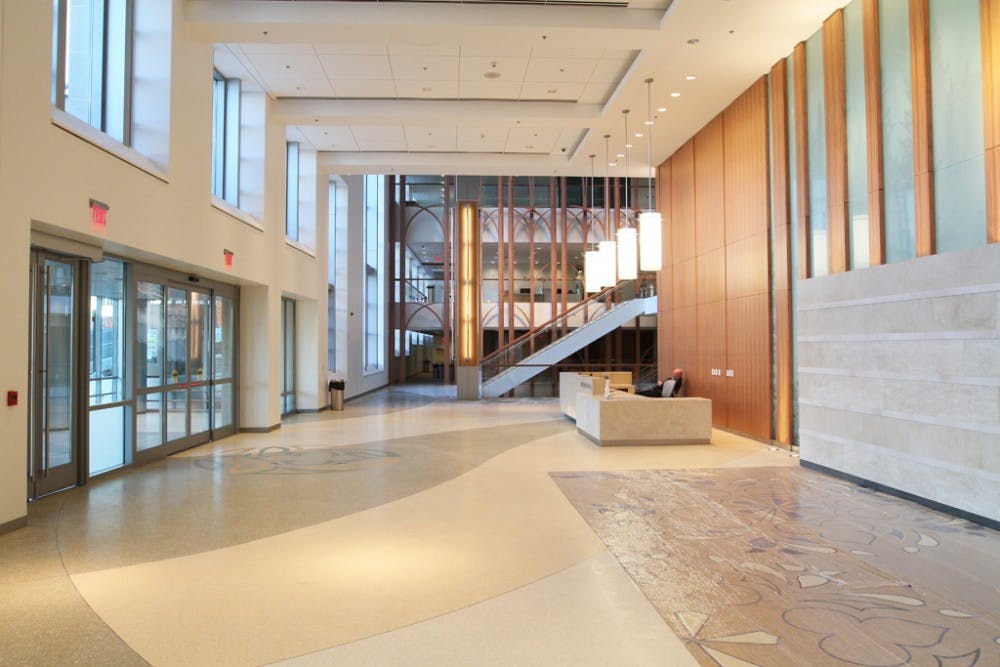Senior Jason Klein couldn’t have expected an experience half way around the world to follow him back to Duke, but after spending a summer in South Africa traveling to cancer clinics, he didn’t want to give up the opportunity to help others in one of life’s greatest struggles.
Upon entrance into the Morris Cancer Clinic, Klein is seen setting up a Disney movie for two small children waiting on a loved one to finish their visit with an oncologist. Klein makes sure they are comfortable in the small waiting area of the clinic, before sitting down to discuss the motivation behind his work at the Duke Cancer Institute in the last year.
“I spent a summer in 2010 in South Africa through DukeEngage, and I was in a very small industrial community where cancer was very prevalent,” Klein said. “My host uncle had a brain tumor, so we were constantly going to clinics. When I came back I wanted to stay involved.”
Since becoming a volunteer with the Duke Cancer Patient Support Program, Klein’s work is about more than pushing a hospitality cart with free food and drinks for patients and their families. Klein has—like many volunteers—made connections with patients on a personal level, calling on shared interests and a natural way of talking.
“One guy was a huge NASCAR fan, so I had a huge conversation about how I had my first cycling race on a NASCAR track,” he said. “One woman even invited me to her ski house…. All the patients here are very nice and very talkative.”
Klein may have turned down skiing, but connecting with patients has been a valuable experience for the aspiring medical researcher who hopes to interact with patients 20 years down the road.
Volunteers such as Klein can be seen daily wearing blue vests, pushing hospitality carts and interacting with patients in the clinic. Students make up 15 percent of the Duke Cancer Patient Support Program’s volunteer force, said Phillip Shoe, the program’s volunteer services coordinator. The number of student volunteers has been increasing in the last few years.
There are about 200 volunteers in the support program who range from the ages of 18 to 85 years old, Shoe said. The program will need more volunteers with the opening of the larger 267,000 sq.-ft Duke Cancer Center Feb. 27, when the center opens to patients for the first time. The new center will feature a centrally located, student-run hospitality stand and facilitate close relationships between patients and volunteers.
“Students bring a lot of energy, and patients are able to talk to students quite easily,” Shoe said.
Shoe noted that the patient support program will aim to have 400 volunteers by 2013. There are a variety of volunteer positions available, however everyone is required to start out as a center docent—a person who escorts patients to their clinic or provides tours for new patients. After fulfilling this role for two semesters, volunteers have the opportunity to work in other areas of the program, such as the KidsCan! program, which helps children who have parents with cancer learn to cope. Volunteers aid children by serving dinner and helping out with activities, such as arts and crafts and games.
Open positions in any of these areas are usually scarce, Shoe said, however, they offer even more chances to get to know patients more deeply. The Solace Care program, for example, is an end of life program designed for patients without families. Volunteers help make the patient’s situation more comfortable by providing them with books, music, candles and any other requests during their last moments.
“Students journal conversations they may have had with the patients, music [the patients] may have listened to and more,” Shoe said. “Anything family would want to know is written down and then sent to the family. Volunteers after this program sit down with therapist for 90 minutes and converse about the experience.”
Sophomore Zayd Ahmed, who has always had in interest in medicine, joined the volunteer program in order to observe clinical treatment and care more directly. Undergraduates can shadow an oncologist after completing 40 hours volunteering.
“I was interested in cancer [specifically] because I had people in my family that had gone through it,” Ahmed said.
Working as a volunteer, he said, has taught him how to interact with patients more effectively. The Duke Cancer Center will undoubtedly improve the general atmosphere in which patients receive treatment, as the upstairs treatment center in the Morris Center is more cramped and with fewer windows. He noted one particular attribute of the new center: patients will be able to receive treatment on a balcony with extra sunlight.
“Interacting with people and seeing their smiles when you give them food or directions makes you feel really warm inside,” Ahmed said. “It’s a great way to give back.”
Get The Chronicle straight to your inbox
Signup for our weekly newsletter. Cancel at any time.

